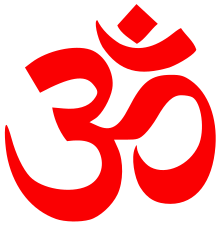
Hinduism is a minority faith in Belize. According to 2010 census, 0.2% of Belize population is Hindu. [1]

| Hinduism by country |
|---|
  |
| Full list |
Hinduism is a minority faith in Belize. According to 2010 census, 0.2% of Belize population is Hindu. [1]
| 2000 | 2010 | |||
|---|---|---|---|---|
| Number | % | Number | % | |
| Total Population | 232,111 | 304,106 | ||
| - Hindu Population | 367 | 0.2 | 612 | 0.2 |
However, the Association of Religion Data Archives states that as of 2005, 2.0% identify as Hindu. [2] According to other sources it is 2.3%. [3]
The Hindu community in Belize today consists mostly of families who arrived in the 1950s, when Belize was still a British colony. The community is composed almost entirely of Sindhis and so there are few cultural differences within it.
Though 3.9% of the population of Belize are Indians, most of them are Christians. Only about 40% are still Hindus.[ citation needed ]
There are two Hindu temples in Belize, the Belize Hindu Temple on Albert Street, Belize city and Sukh Shanti Temple, Corozal. [4] Festivals like Diwali, [5] Janmashtmi [6] are celebrated by Hindus in this temple.

Hindus are people who religiously adhere to Hinduism. Historically, the term has also been used as a geographical, cultural, and later religious identifier for people living in the Indian subcontinent.

Diwali is the Hindu festival of lights, with variations celebrated in other Indian religions. It symbolises the spiritual "victory of light over darkness, good over evil, and knowledge over ignorance". Diwali is celebrated during the Hindu lunisolar months of Ashvin and Kartika—between around mid-September and mid-November. The celebrations generally last five or six days.

Hinduism in Southeast Asia had a profound impact on the region's cultural development and its history. As the Indic scripts were introduced from India, people of Southeast Asia entered the historical period by producing their earliest inscriptions around the 1st to 5th century CE. Today, Hindus in Southeast Asia are mainly Overseas Indians and Balinese. There are also Javanese and Balamon Cham minority in Cambodia and south central Vietnam who also practice Hinduism.

Hinduism is a minority religion in South America, which is followed by even less than 1% of the total continent's population. Hinduism is found in several countries, but is strongest in the Indo-Caribbean populations of Guyana and Suriname. There are about 320,000 Hindus in South America, chiefly the descendants of Indian indentured laborers in the Guianas. There are about 185,000 Hindus in Guyana, 120,000 in Suriname, and some others in French Guiana. In Guyana and Suriname, Hindus form the second largest religion and in some regions and districts, Hindus form the majority. Though in recent times, due to influence of Hindu culture the number of Hindus converts have increased in other countries in South America, including Brazil, Argentina, Venezuela and others.
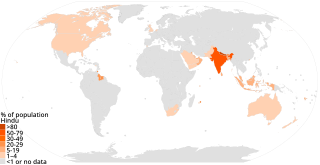
Hinduism has approximately 1.2 billion adherents worldwide. Hinduism is the third largest religion in the world behind Christianity (31.5%) and Islam (23.3%).

Hinduism is the third largest religion in Australia consisting of more than 684,002 followers, making up 2.7% of the population as of the 2021 census. Hinduism is the fastest growing religion in Australia mostly through immigration. Hinduism is also one of the most youthful religions in Australia, with 34% and 66% of Hindus being under the age of 14 and 34 respectively.

Hinduism is the leading single religion of the Indo-Caribbean communities of the West Indies. Hindus are particularly well represented in Guyana, Suriname and Trinidad and Tobago. The Cayman Islands also hosts a sizable Hindu population, with 2.4 percent of the country affiliating with the religion. Smaller groups of Indo-Caribbeans live elsewhere in the Caribbean, especially Puerto Rico, Jamaica, Belize, Barbados, Saint Vincent and the Grenadines, Saint Lucia, and Bahamas.
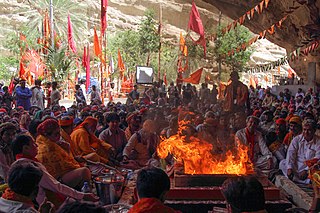
Hinduism is the second largest religious affiliation in Pakistan after Islam. While Hinduism was one of the dominant faiths in the region a few centuries back, today Hindus account for only 2.14% of Pakistan's population or about 4.4 million people according to the 2017 Pakistani census. The Umerkot district has the highest percentage of Hindu residents in the country at 52.2%, while Tharparkar district has the most Hindus in absolute numbers at 714,698.

Hinduism is the third largest religious group in the United Kingdom, after Christianity and Islam; the religion is followed by around 1.7% of the total population of the nation. Hindus had a presence in the United Kingdom since the early 19th century, as at the time India was part of the British Empire. Many Indians in the British Indian Army settled in the United Kingdom of Great Britain and Northern Ireland. According to 2021 United Kingdom census, 1,032,775 residents (1.7%) identified themselves as Hindus.

The official religion of Pakistan is Islam, as enshrined by Article 2 of the Constitution, and is practised by approximately 96.47% of the country's population. The remaining 3.53% practice Hinduism, Christianity, Ahmadiyya Islam, Sikhism and other religions.

Hindu religion and culture in Singapore can be traced to the 7th century AD, when Temasek was a trading post of Hindu-Buddhist Srivijaya empire. A millennium later, a wave of immigrants from southern India were brought to Singapore, mostly as coolies and indentured labourers by the British East India Company and colonial British Empire. As with Malay peninsula, the British administration sought to stabilise a reliable labour force in its regional plantation and trading activities; it encouraged Hindus to bring family through the kangani system of migration, settle, build temples and segregated it into a community that later became Little India.

Hinduism is the second-largest religion in Fiji, and primarily has a following among Indo-Fijians, the descendants of indentured workers brought to Fiji by the British as cheap labour for colonial sugarcane plantations. Hindus started arriving in Fiji starting in 1879 and continuing through 1920, when Britain abolished the slavery-like indenture system. Fiji identifies people as "Indo-Fijians" if they can trace their ancestry to the Indian subcontinent, Hindus form about 27.9% the population of Fiji.
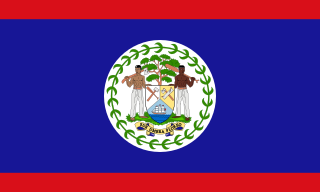
Christianity is the dominant religion in Belize. The single largest denomination is the Catholic Church with about 40.1% of the population, a reduction from 49.6% of the population in 2000, 57.7% in 1991 and 61.9% in 1980, although absolute numbers have still risen. Other major groups include Pentecostal with 8.4% of the population up from 7.4% in 2000 and 6.3% in 1991, Seventh-day Adventists with 5.4% of the population up from 5.2% in 2000 and 4.1% in 1991. The following of the Anglican Church has been steadily declining, with only 4.7% of the population in 2010 compared to 6.95% in 1991. About 12,000 Mennonites live mostly in the rural districts of Cayo and Orange Walk. People who declared they belong to no religion make up 15.5% of the population in 2010, more than double their 2000 census numbers. 11.2% adhere to other religions which include the Maya religion, Afro-Caribbean religions, Mormons, Hindus, Buddhists, Muslims, Baháʼís, Rastafarians and others.
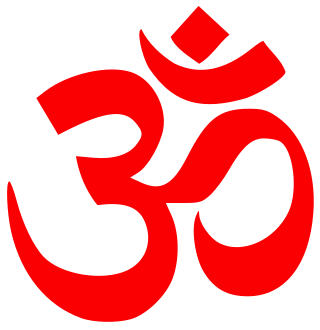
Hinduism is a minority religion in Sweden practised by 0.13% of the population or 13,000 people out of a population of 10.5 million. Hinduism is practised mainly by persons of Indian origin and non-resident Indians together. A majority of them are Tamils, Punjabis, Bengalis, Gujaratis, Telugu's and Kannadigas.

Most of the 25-30 million followers of Sikhism, the world's fifth-largest religion, live in the northern Indian state of Punjab, the only Sikh-majority administrative division on Earth, but Sikh communities exist on every inhabited continent. Sizeable Sikh populations in countries across the world exist in India (20,833,116), Canada (771,790), England (520,092), the United States (~280,000), Italy (~220,000), and Australia (210,400), while countries with the largest proportions of Sikhs include Canada (2.12%), India (1.56%), Cyprus (1.1%) England (0.92%), New Zealand (0.87%), and Australia (0.83%).

Christianity is the predominant religion in Kiribati, with Catholicism being its largest denomination.

Mauritius is a religiously diverse nation, with Hinduism being the most widely professed faith. According to the 2011 census made by Statistics Mauritius, Hinduism is the major religion at 48.54%, followed by Christianity at 32.71%, followed by Islam 17.30% and Buddhism 0.18% in terms of number of adherents.
Religions in Karachi include Islam, Christianity, Hinduism, Sikhism, Buddhism, Zoroastrianism and others. According to a 1998 census of Pakistan, the religious breakdown of the city is as follows: Muslim (96.45%), Christian (2.42%), Hindu (0.86%), Ahmadis (0.17%) and other (0.10%). Other religious groups include Parsis, Sikhs, Baháʼí, Jews and Buddhists. Of the Muslims, approximately 66% are Sunnis and 34% are Shi'ites. The Sunnis follow Hanafi fiqh while Shi'ites are predominantly Ithnā‘Ashariyyah fiqh, with significant minority groups who follow Ismaili Fiqh, which is composed of Nizari, Mustaali, Dawoodi Bohra and Sulaymani fiqhs.
Hinduism is the third largest religion in Malta after Christianity and Islam. However, it's not recognized as a formal religion. As of the 2021 census, there are 6,411 Hindus in Malta that constituted 1.42% of its population.